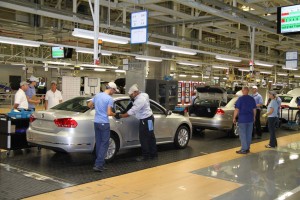Volkswagen will create another 800 jobs at its new assembly plant in Chattanooga, Tennessee as it pushes to meet soaring demand. That comes on top of previous plans that will now bring a total of 1,000 new workers to the factory that opened only last year.
The Chattanooga plant is the first the German maker has operated in the U.S. in a quarter century and is a critical part of the maker’s commitment to boost sales to record levels by 2018. But equally significant has been VW’s decision to develop cars specifically for the U.S. market for the first time, including the new Passat sedan being produced in Tennessee.
Sales of the new Passat got off to a fast start for the 2012 model-year, helping Volkswagen score its best monthly volumes in four decades in February.
“This is a clear sign that the plant ramp-up has been successful and is a validation that the Passat is of the highest quality,” said Frank Fischer, CEO of the Chattanooga operation.
The factory already employs 2,200 Volkswagen employees – and, in an unusual arrangement, it also houses another 500 working for supplier Aerotek. Traditionally, such partners maintain a separate facility. But the idea of bringing suppliers right into the plant is gaining traction as manufacturers struggle to hold down costs.
The new VW plant was, ironically, built on an old U.S. Army weapons depot that was used to store weaponry that was used in the battle against Germany in World War II. The site itself is large enough to significantly expand the current plant – VW officials acknowledging to TheDetroitBureau.com that they want the opportunity to grow if the demand is there.
“We have made a commitment to this market,” Jonathan Browing, CEO of Volkswagen Group of America, said in reference to the planned hirings. “Our original commitment to invest $4 billion into the U.S. market continues to grow.”
The latest news follows word VW will build a $40 million warehouse complex near the Chattanooga plant to support its U.S. growth.
VW is not saying how much it now plans to expand capacity but it was already shooting for an output of around 150,000 by later this year.
The German maker had its heyday in the American market in the 1960s and ‘70s, largely on the back of the original Volkswagen Beetle. Demand began to wane with the switch to the Rabbit, and a combination of lowered sales and manufacturing issues led VW to abandon a factory in Westmoreland, Pennsylvania nearly a quarter century ago.
After long focusing on other markets – including emerging nations like China – VW began to rethink matters and, four years ago announced plans to boost total Group sales to more than 800,000 by 2018.
Along with the U.S. version of the Passat, the maker has also scored with an Americanized Jetta. It is hoping to reconnect with buyers with an all-new, third-generation Beetle, as well, the new model migrating to what VW describes as a more “masculine” design that the outgoing Beetle.

